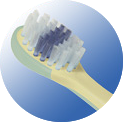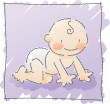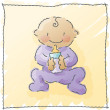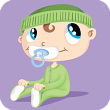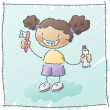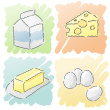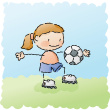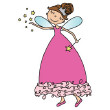Primary teeth (or "baby" teeth) are very important for your child’s health. They serve many functions until they are replaced between age of 6 to 12 years old. They help children speak clearly and chew their food. They are
an essential part of children’s smile and self-esteem. They also aid in forming a path that permanent teeth can follow when they are ready to erupt. If infections (dental caries, or “cavities”) of the primary teeth are left untreated, the infection can cause severe pain and/or spread to the newly erupted permanent teeth. At times, untreated dental infection can spread to other parts of the body and can be life threatening.
Tags: baby teeth
Select a quality
toothbrush especially designed for infants. Look for features such as soft-bristles for gentle cleaning, and small brush-head for easier access. Brush all surfaces of your baby’s teeth and gum with water at least once a day at bedtime. Unless your child’s pediatric dentist advises it, do not use fluoridated toothpaste until age 2-3. Thorough and regular brushing will remove plaque bacteria that can lead to decay.
Tags: baby teeth, toothbrush
The sooner you start, the easier it is to build this healthy habit. Starting at birth, you can start cleaning your child’s gum with a soft infant toothbrush and water.
Tags: baby teeth
“First visit by first birthday.” A child should have his/her first dental visit when the first tooth appears (usually between six to twelve months of age), or before his/her first birthday, whichever comes first. Early examination and preventive care will protect your child’s smile now and in the future.
Tags: infant, First visit
The earlier the dental visit, the better the chance of preventing dental problems. Dental problems can begin early. An example is Early Childhood Caries (also know as baby bottle tooth decay or nursing caries). Your child risks severe decay from using a bottle during naps or at night or when they nurse continuously from the breast.
Children with healthy teeth chew food easily, learn to speak clearly, and smile with confidence. Start your child now on a lifetime of good dental habits.
Tags: infant, First visit
Teething of primary (baby) teeth usually occurs from six months to age 3. Your child’s gums may feel sore when teeth erupt. Many children like a clean chilled teething ring, cool spoon, or cold wet washcloth. Alternatively, you may massage the gums with a small toothbrush and cool water.
Tags: teething, infant, baby teeth
Children should be weaned from the
bottle at 12-14 months of age.
Tags: bottle
Children should not fall asleep with a
bottle. At-will nighttime
breast-feeding should be avoided after the first primary (baby) teeth appear. As they approach their first birthday, encourage your child to drink from a cup. Avoid offering juice in a bottle; do use a cup or straw, and discourage slow sipping.
Tags: bottle, tooth decay, breast-feeding
Contact your pediatric dentist as soon as possible. To comfort your child, rinse the child’s mouth with warm salt water. Give the child age-appropriate over-the-counter acetaminophen for any pain, and be sure to follow its dosage instructions. Do not place aspirin on the teeth or gums. Do not place heat on sore area. If the face is swollen, place a cold pack on the swollen area. Finally, see a dentist as soon as possible.
Tags: tooth decay, toothache
Before the child’s second birthday,
thumb and
pacifier sucking habits are considered natural behavior. Most children stop these habits on their own. However, if your child’s thumb or finger sucking habits persists past the age of three, they can create crowded and crooked teeth, as well as bite and speech problems. It is recommended for parents to encourage their child to stop his/her sucking habits by the age of three. Visit us for recommendation of encouragement methods. If encouragement methods fail, a mouth appliance may be recommended to block the habits.
Tags: thumb sucking, pacifier
A check-up every six months is recommended in order to prevent cavities and other dental problems. However, your pediatric dentist may customize when and how often your child should have the
check-up based on his/her oral health.
Tags: dental visit, check-up
Fluoridated
toothpaste should be introduced when a child is two to three years of age. Prior to that, parents should clean the child's teeth with water and a soft-bristled toothbrush. When toothpaste is used after age two to three, parents should supervise and/or perform the brushing and make sure very small amount (a thin smear) of toothpaste is used. Encourage your child to spit out and not swallow excess toothpaste after brushing.
Tags: toothpaste
The first thing to do is to make sure your child has a balanced
healthy diet. This balanced healthy diet includes eating foods from the following major food groups everyday: Fruits and Vegetables; Breads and Cereals; Milk and Dairy Products; Meat, Fish and Eggs.
Next, check how frequently your child eats foods and drinks with
sugar or starch in them. Foods with starch include breads, crackers, pasta and such snacks as pretzels and potato chips. Fresh fruits and vegetables and foods that are high in proteins and low in sugar/starch are generally better for teeth. Avoid drinking soda. Limit juices during meal times only. Encourage your child to drink lots of water in between meals. You are welcome to contact us to help you select foods that protect your children's teeth.
Tags: healthy diet, sugar
Sealants are protective coatings helping to keep teeth cavity-free. They are made of clear or tooth-colored plastic applied to the grooved and pitted surfaces of the teeth. Generally, sealants are applied to the chewing surfaces of back teeth where most cavities in children are found.
Tags: sealants
Even if your child brushes and flosses carefully, it is difficult (sometimes impossible) to clean the tiny grooves and pits on certain teeth. Food and bacteria build up in these crevices, placing your child in danger of tooth decay. Sealants "seal out" food and plaque, thus reduce the risk of dental decay (cavities).
Tags: sealants
A mouth guard should be a top priority on your child's list of sports equipment. Athletic mouth protectors, or mouth guards, are made of soft plastic and fit comfortably to the shape of the upper teeth. They protect a child's teeth, lips, cheeks and gums from sports-related injuries. Any mouth guard works better than no mouth guard, but a custom-fitted mouth guard fitted by our doctor is your child's best protection against sports-related injuries.
Tags: injury
The most important thing to do is to remain calm. Find the tooth and rinse it gently in cool water. (Do not scrub it or clean it with soap -- use just water!) If possible, replace the tooth in the socket and hold it there with clean gauze or a washcloth. If you can't put the tooth back in the socket, place the tooth in a clean container with milk, saliva, or water. Get to the pediatric dental office immediately. (Call the emergency number if it's after hours.) The faster you act, the better your chances of saving the tooth.
Tags: dental trauma
Contact the pediatric dentist as soon as possible. Do not place the baby tooth back in the socket.
Tags: dental trauma
Contact your pediatric dentist immediately. Quick action can save the tooth, prevent infection and reduce the need for extensive dental treatment. Rinse the mouth with water and apply cold compresses to reduce swelling. If you can find the broken tooth fragment, bring it with you to the pediatric dentist.
Tags: dental trauma
Nitrous oxide (commonly known as "laughing gas") is a safe and effective technique used to calm a child's anxiety of the dental visit. Nitrous oxide is a mix of two gases: oxygen and nitrous oxide. When inhaled, it is absorbed by the body and has a calming effect. Nitrous oxide is perhaps the safest sedative in dentistry since the child remains fully conscious during treatment. At the end of the procedure, nitrous oxide is easily excreted from the body by administering 100% oxygen.
Tags: laughing gas, nitrous oxide
Certainly! Pediatric dentists are especially careful to limit the amount of radiation to which children are exposed. At Corona Kids Dental, we utilize modern digital X-rays and safeguards to ensure the amount of radiation received in our dental X-ray examination is extremely small. In fact, dental X-rays represent a far smaller risk than an undetected and untreated dental problem.
Tags: x-ray
Pediatric dentists are the pediatricians of dentistry. A pediatric dentist has two to three years of specialty training following dental school and limits his/her practice to treating children only. Pediatric dentists are primary and specialty oral care providers for infants and children through adolescence, including those with special health needs.
[more info]Tags: Pediatric dentist
 an essential part of children’s smile and self-esteem. They also aid in forming a path that permanent teeth can follow when they are ready to erupt. If infections (dental caries, or “cavities”) of the primary teeth are left untreated, the infection can cause severe pain and/or spread to the newly erupted permanent teeth. At times, untreated dental infection can spread to other parts of the body and can be life threatening.
an essential part of children’s smile and self-esteem. They also aid in forming a path that permanent teeth can follow when they are ready to erupt. If infections (dental caries, or “cavities”) of the primary teeth are left untreated, the infection can cause severe pain and/or spread to the newly erupted permanent teeth. At times, untreated dental infection can spread to other parts of the body and can be life threatening.
